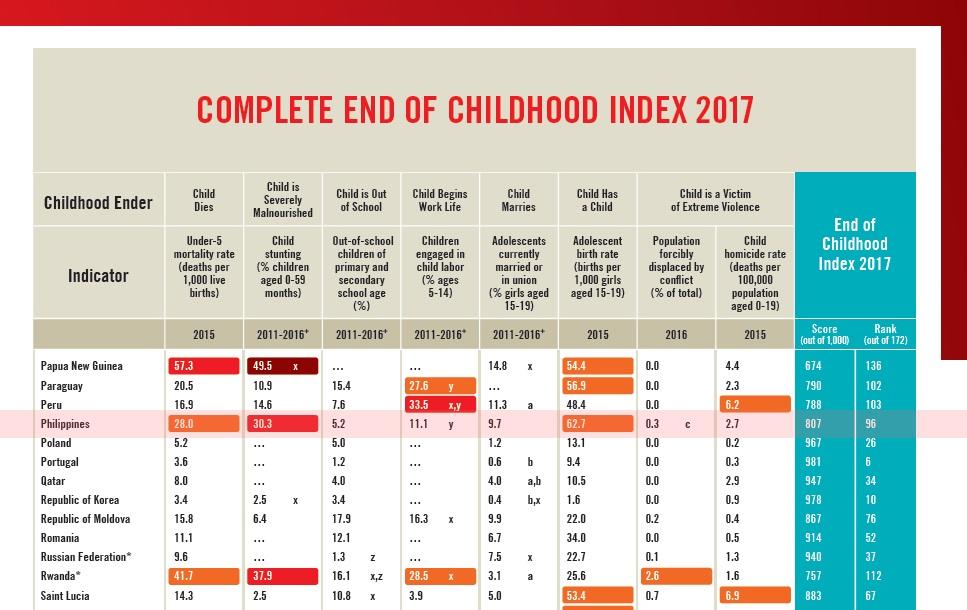Poverty, malnutrition drag PHL ‘End of Childhood Index’ rank to 96th
The Philippines ranked 96th out of 172 countries in the End of Childhood 2017 report, released by Save the Children on Thursday, June 1. The release coincides with International Children's Day.
The country lags behind ASEAN neighbors Vietnam (92), Thailand (84), Malaysia (65), Brunei Darussalam (64), and Singapore (33).
The country also lags behind the Democratic People's Republic of Korea / North Korea, which ranked 78th.

The report identified eight factors that end childhood:
- child dies
- child is severely malnourished
- child is out of school
- child begins work life
- child marries
- child has a child
- child is a victim of extreme violence
The seven other factors, excluding "child dies," end childhood in that it places the youth in situations that are not appropriate to their age.
Child mortality (child dies), child stunting (child is severely malnourished), and adolescent birthrate (child has child) were singled out as key factors that pulled down the Philippines' ranking.
Ned Olney, country director for Save the Children Philippines, noted during the launch of the report that newborn mortality has not come down and that little investment has been placed in improving the situation.
The organization's Health and Nutrition Adviser Dr. Amado Parawan relates this number to chronic undernutrition, which starts from the womb. Women who have little access to food give birth to babies with low birth weight and these newborns are the most susceptible to diseases and even death — a vicious cycle that affects generations.
Dr. Parawan additionally shared that babies who weigh less than 2.5kg at birth are four times more likely to die within 28 days.
These problems—and every other factor identified in the index—are symptoms of the bigger crisis of poverty and inequality in the country. The poor have little to no access to basic services and have little to no means of improving their situation.
"There are poorer countries [that] have done better on the ranking than the Philippines because of political will," Olney told GMA News Online in an exclusive interview. "They've been able to harness resources better to address their issue of poverty."
"Ultimately, if you don't solve poverty and the system that makes poverty possible, this problem will continue," he added.
Olney further explained that the Philippines has resources, but the problem lies in access—including access to the knowledge that helping people rise from poverty benefits the entire country.
"If you think about it, increasing the number of productive members of society is great for everyone ... What does it do even for the billionaires of the Philippines to have millions of workers who are under-educated and undernourished and less productive? It doesn't help them. Rising tide lifts all boats, as we say," Olney said.
He added, "You need to invest in the poorest of the poor. I am scared for countries that have this never-ending expansion of the difference between the rich and the poor. We all live in the same country .... I really believe that you need to invest in the poor to help everyone."
In a previous report, The Cost of Hunger, Save the Children revealed that the Philippines loses at least P328 billion a year because of malnutrition, with around P166.5 billion in lost productivity and income due to lower levels of education attained by malnourished children, P160 billion lost because of premature deaths, and an additional P1.23 billion spent for grade repetition still linked malnutrition.
The End of Childhood Report 2017 lists Norway, Slovenia, Finland, Netherlands, Sweden, Portugal, Ireland, Iceland, Italy, and Belgium as the top eight for children to grow up. Tied in 10th place are Belgium, Cyprus, Germany, and Republic of Korea/South Korea.
Guinea, Sierra Leone, Burkina Faso, South Sudan, Chad, Somalia, Central African Republic, Mali, Angola, and Niger were at the bottom of the list. — BM, GMA News



